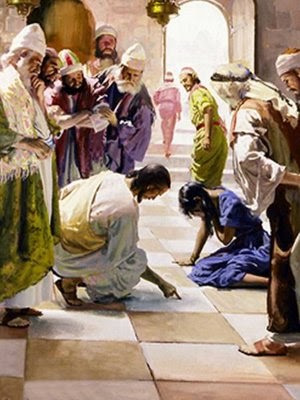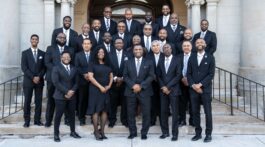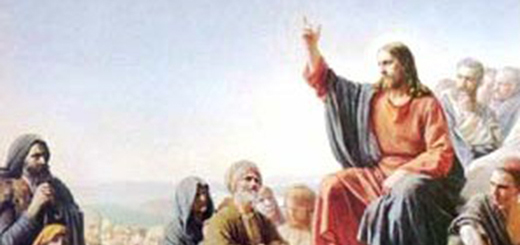This year so far we have studied how Jesus treated children, the sick, and the poor, working classes. All of these categories consist of individuals who we often see marginalized in society–kept on the edges, pushed into the background, ignored and neglected by others.
But this week, we take up another group, whose plight is even more desperate. Those who the Jews were totally distant from. Did Jesus actually associate with this dangerous class of people? In today’s world that might be prostitutes, mentally deranged criminals, and the homeless. In some circles we might still include homosexuals, illegal aliens, and minority races. Are we expected to include them in our evangelistic efforts and disciple them as well? Let’s find out more about them and see how Jesus interacted with sinners of the worst kind.
Memory Text: “The woman then left her waterpot, went her way into the city, and said to the men, ‘Come, see a Man who told me all things that I ever did. Could this be the Christ?'” John 4:28-30 NKJV
Although we’ll examine this story of the woman at the well more fully later in the lesson, pause to consider one point now. She left her waterpot. Now that was an excited woman! It would be like a woman at a checkout counter, getting her money out of her purse to pay for a purchase, but becoming so involved with a conversation with the cashier that she left her purse and her merchandise right there to tell everyone some good news.
Like I said, that was one excited woman! When was the last time the good news in God’s Word got YOU that excited?
Sunday: Bottom Dwellers
All societies have established hierarchies, ladders, if you will. On the top rung of the ladder you usually find the most wealthy and well-educated people. The middle rungs consist of ordinary people, often referred to as the middle class–the working people. But then there are others, just barely hanging onto the ladder down at the bottom.
We’ve already talked about who these people are. Except in Jesus’ day, the list would also include lepers and tax collectors. How did Jesus treat these people then? Did He make any efforts to save them too? And what kind of behavior does He expect from us in relating to them?
The answer to this might be found in some of Jesus’ parables. Let’s look at them and ponder what He meant by these stories?
- Matthew 21:28-32 The man who had two sons…one said he wouldn’t go work in the field, but later did–and the other who said he would work in the field, but didn’t. Jesus explained in v. 31 that this meant that the publicans and harlots (the social outcasts) would make it to heaven before the chief priests and elders because they were doing the will of their Father. The point for us to dwell on here is that both sons were asked. The invitation for salvation should be given to all God’s children.
- Luke 15:1-7 The missing sheep (1 out of a hundred)…Remember, the shepherd didn’t rejoice just because the missing sheep happened to wander back on its own. He went out to look for that sheep!
- Luke 15:8-10 The missing coin…How diligently the woman searched for her lost coin. How diligently are we looking for lost souls today?
Jesus was explaining to the religious elite why He was ministering as He did to all people. They just couldn’t fathom His association with these social outcasts, but Jesus let them know in no uncertain terms that all people were valuable in God’s eyes.
As a matter of fact, that is precisely how Jesus ministered to the social outcasts. He recognized their emotional emptiness and their lack of self-worth. By consistently loving and accepting them by seeing their value, their once-cold hearts were melted and molded after His likeness.
The four examples of outcasts in our lesson this week include:
- The adulterous woman, caught “in the very act” (John 8:1-11)–Monday
- The dangerous demoniac, living in the cemetery (Mark 5:1-20)–Tuesday
- The Samaritan woman at the well (John 4:5-32)–Wednesday
- The calling of Matthew, a loathed tax collector, to be a disciple (Matthew 9:9-13)–Thursday
Discussion Questions: Luke 18:10-12 includes the prayer of a proud Pharisee, “I thank thee that I am not as other men are…” But the prayer doesn’t stop there. How do you see the real attitude problem this Pharisee had in the rest of his prayer?
By contrast, how would you describe the prayer of the publican in Luke 18:13-14?
Monday: “In the Very Act”
 Although the purpose of this humiliating experience was to entrap Jesus, He found a way to use it to signify for all time how sin should be dealt with.
Although the purpose of this humiliating experience was to entrap Jesus, He found a way to use it to signify for all time how sin should be dealt with.
The end result of writing in the sand the sins of her accusers was not just to show her mercy and the way out of a cruel death by stoning. The Pharisees themselves were shown mercy too, by the quiet revelations to be seen by no one but themselves.
The love shown by Jesus in this one incident leaves no doubt as to the purpose and mission of Jesus to save us, not condemn us. He gives comfort and hope to the woman, and to all who end up at His feet. Even to one who was dragged there through no choice of her own.
Discussion Questions: Keeping in mind that most people, especially social outcasts, are already aware of their sinful actions and bad habits, how do we influence them to improve their situations without preaching to them about their sins? What kinds of actions will draw them closer to God, and what kind will turn them away from us and God?
Tuesday: The Lowest of the Low
If anyone seemed hopeless, it was this demoniac who had broken the chains and fetters of his caregivers and was living among the tombs in a forsaken cemetery in the country of the Gadarenes. And yet, Jesus saw fit to heal him of his demon possession and even gave him a special ordination to minister and witness to those of his local community, when the man begged to follow Jesus personally.
How did Jesus treat this demoniac? It wasn’t just the act of removing the devils who had possessed him, but the motive behind that action.
“…Go home to thy friends and tell them how great things the Lord hath done for thee, and hath had compassion on thee.” Mark 5:19 KJV
This story illustrates how even for those hopeless cases who seem beyond any help, we can still minister to them by showing them compassion through:
- mercy
- respect, and
- kindness
Discussion Questions: Besides praying with or for someone, in what ways can we minister to the needs of people that might ultimately show them or someone else the love of God?
Does God expect us to only help those who help themselves, only those who want or ask for our help, or only those who have a possibility of becoming a Christian through our efforts? Just who does God expect us to help? In other words, who is our neighbor?
Wednesday: The Woman at the Well
Thankfully, John gives us a marvelously complete picture of Jesus’ interaction with the Samaritan woman at the well. John, the beloved disciple, seems likely to be the one impressed by Jesus’ loving interaction with her that day.
Jesus’ approach was certainly unconventional. Besides the fact that even the disciples revealed their hidden prejudice for the woman, and wondered why Jesus even bothered to speak one word to her, the things He said were unexpected too, to say the least.
Two things should be noted in their exchange though.
- First, He sought to win her trust in a simple, unassuming way that caught her attention. He just asked her for some water to drink. Do we always have to be the one offering help? Might it put us on a more equal footing by asking for assistance rather than always being the one to give it?
- Second, Jesus presented Himself as the solution to her problems, before addressing any of her problems by revealing that He already knew what they were. Don’t we usually go about it the other way around? We clumsily point out someone’s mistakes, then offer them the solution. Most of the time, they already know what their problems are. They just have to be convinced that God is bigger than their challenges.
Discussion Question: Read John 4:27: “And upon this came his disciples, and marvelled that he talked with the woman: yet no man said, What seekest thou? or, Why talkest thou with her?” KJV This verse indicates that the disciples held prejudices, but were hesitant to voice them to their Master. What kind of prejudices might we have today, but feel hesitant to reveal, even to our closest friends?
Thursday: Publicans and Sinners
After calling Matthew, a hated tax collector, to be one of His disciples, Jesus was often found in the company of him and others at Matthew’s house. The Pharisees were incensed that Jesus even ate with these sinners, let alone was caught visiting in their homes. He actually seemed to be enjoying their company, a real threat to their traditions and self-righteous attitudes.
Discussion Questions: It is said that we must leave our comfort zone in order to help those on the fringes of society. Can we leave our comfort zone though, and not feel uncomfortable? In what way could that be the goal, and how can you make it happen?
Even though you may not be able to fully fit in with some social circles, are there ways to participate in some of their activities without compromising your Christian values? Give examples.
Summary: “Christ honored man with His confidence and thus placed him on his honor. Even those who had fallen the lowest He treated with respect. It was a continual pain to Christ to be brought into contact with enmity, depravity, and impurity; but never did He utter one expression to show that His sensibilities were shocked or His refined tastes offended. Whatever the evil habits, the strong prejudices, or the overbearing passions of human beings, He met them all with pitying tenderness. As we partake of His Spirit, we shall regard all men as brethren, with similar temptations and trials, often falling and struggling to rise again, battling with discouragements and difficulties, craving sympathy and help. Then we shall meet them in such a way as not to discourage or repel them, but to awaken hope in their hearts.” ~Ellen G. White, The Ministry of Healing, pp. 164, 165.
Challenge: Choose one of the following individuals who you feel least likely to want to associate with–
- homeless person, panhandling by the side of the road
- meth addict, who has been in rehab more than once
- high school dropout, and member of a gang
- prostitute, not a minor
- emotionally troubled teen, from a wealthy and nurturing family
- illegal immigrant, who refuses to learn English
- a sex offender, who has served his sentence
- pregnant teen, who can’t decide whether to keep her baby
Now consider the following questions by imagining how life must be for that individual:
- Where would you live?
- How would you get money to survive?
- Who would you trust?
- How would people treat you?
- What experience would you have had with church-going people?
- How do you imagine you would get out of your own difficulties?
- What would be your greatest regrets?
Think of some ideas of how you or your church might minister to people who have these experiences and challenges. Begin to implement one of your ideas this week. Try to make a difference in someone’s life in a tangible way.
My favorite quote: “You have not lived a perfect day unless you have done something for someone who will never be able to repay you.” ~Ruth Smeltzer
Next Week: With the Rich and Famous










